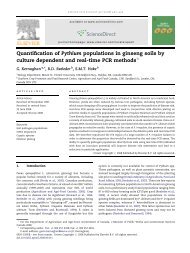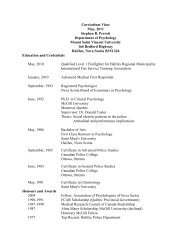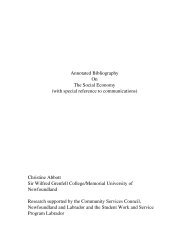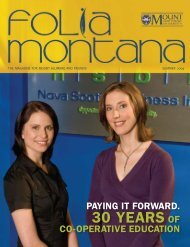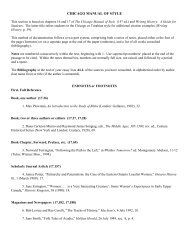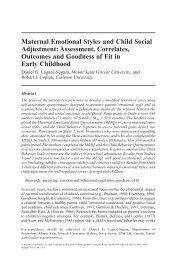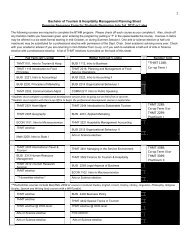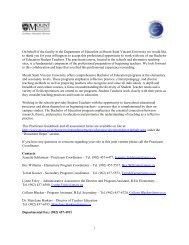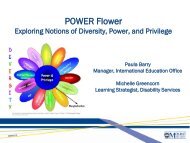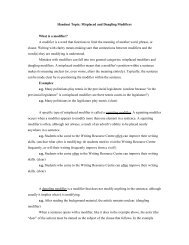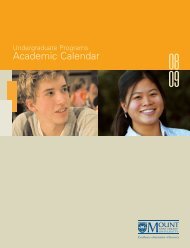SOAN 1103 - Introduction to Sociology
SOAN 1103 - Introduction to Sociology
SOAN 1103 - Introduction to Sociology
You also want an ePaper? Increase the reach of your titles
YUMPU automatically turns print PDFs into web optimized ePapers that Google loves.
FACULTY OF ARTS AND SCIENCESOCIOLOGY AND ANTHROPOLOGYINTRODUCTION TO SOCIOLOGY <strong>SOAN</strong> <strong>1103</strong>.02COURSE OUTLINE Winter 2012ALAN D. BROWNEVARISTUS 440OFFICE HOURS: TUESDAY 1:00-3:00 AND BY APPOINTMENTPHONE: 457-6239EMAIL: ALAN.BROWN1@MSVU.CA (PLEASE USE THIS EMAIL FOR ALL CONTACT)TEACHING AND LEARNING PLATFORMMoodle login: http://moodlelive.msvu.caMoodle Student Guide: http://moodlelive.msvu.ca/mod/resource/view.php?id=34234Technical Help: If you require assistance with Moodle, please first contact DistanceLearning: (902) 457-6717; Email: online@msvu.caCLASS MEETS: MONDAY/WEDNESDAY 12:30-1:45 (SAC AUD A)COURSE DESCRIPTION An examination of the basic concepts and subject matter ofsociology focusing on social relationships, group behaviour, social roles across the lifecycle, and introduction <strong>to</strong> the various subfields of sociology. Processes such asurbanization, social movements, deviance, and socialization will be studied. Note:Students who have received credit for <strong>SOAN</strong> 1101, <strong>SOAN</strong> 2100, or <strong>SOAN</strong> 1100 may nottake this course for credit. <strong>SOAN</strong> 1102 <strong>to</strong>gether with <strong>SOAN</strong> <strong>1103</strong> count as the equivalen<strong>to</strong>f <strong>SOAN</strong> 1101.COURSE PRE-REQUISITES NONECOURSE GOAL This course is an introduction <strong>to</strong> the main concepts, theories andmethods used by sociologists <strong>to</strong> study society, examine the nature of social life, and<strong>to</strong> understand social differences, inequalities, institutions and change in society. Byacquainting ourselves with sociology we will be better able <strong>to</strong> understand our ownactions and the actions of others and so identify and perhaps change those socialconditions which constrain human potential and help build conditions which allow it<strong>to</strong> develop.1
STUDENT LEARNING OBJECTIVES After completing this course the student will beable <strong>to</strong>:• Explain the sociological perspective.• Explain the major theoretical perspectives within sociology.• Identify the main research methods used in sociology.• Analyze the nature of social life using basic sociological concepts.• Analyze social differences and inequalities using basic sociological concepts.• Analyze a number of social institutions using the major theoreticalperspectives within sociology.COURSE TEXT(S) THERE ARE 6 REQUIRED BOOKS FOR THIS COURSE:Coates, Ken S. and Bill Morrison (2011). Campus Confidential: 100 Startling ThingsYou Don’t Know About Canadian Universities. Toron<strong>to</strong>: Lorimer. (C&M)Coontz, Stephanie (1992 [2000]). The Way We Never Were: American Families andthe Nostalgia Trap. New York: Basic Books (SC)Scott, John and Gordon Marshall (2009). Oxford Dictionary of <strong>Sociology</strong>. Oxford:Oxford University Press. (S&M)Tattrie, Jon (2010) The Hermit of Africville: The Life of Eddie Carvery.Lawrence<strong>to</strong>wn Beach: Pottersfield Press. (JT)Venkatesh, Sudhir (2008). Gang Leader for a Day: A Rogue Sociologist Takes <strong>to</strong>the Streets. New York: Penguin Press. (SV)Wilkins, Amy C. (2008). Wannabes, Goths, and Christians: The Boundaries of Sex,Style and Status. Chicago: University of Chicago Press. (AW)ONLINE RESOURCESAdditional readings will be posted <strong>to</strong> our course website on Moodle and will bemarked required (r) or optional (o) accordingly. I also encourage students <strong>to</strong> makeuse of the public forum and posting facilities available <strong>to</strong> them on our coursewebpage.TEACHING AND LEARNING STRATEGIESThis course is designed in the spirit of the principles of active learning. My role in thecourse is <strong>to</strong> facilitate and encourage discussion and debate. Notes and handouts willbe provided from time <strong>to</strong> time <strong>to</strong> assist you in your note taking and for preparing yourwritten work.2
SYLLABUS (WHAT WE WILL BE DOING, LEARNING AND WHEN THROUGHOUT THE COURSE):Date Topic Core Reading ActivityJan 4 <strong>Introduction</strong> <strong>to</strong> Class N/AJan 9-11 Theory and Method Mills (r)Berger (r)Tearoom (r):Assignment: Syllabus (Jan13)• Humphreys• WarwickBabbie• NardiJan 16-18 Cultural Structures WilkinsJan 23 “” “”Flashmob (r)Jan 30-Feb1Personal Worldsand IdentityCoontzFeb 6-8 “”Assignment: Door Crawl (Feb3)Feb 13-15 Conflict Marx (r) Midterm (Feb 15)Feb 27-29VenkateshMar 5-7 “”Mar 12-14 Inequalities Tattrie Assignment: Flash Mob (Mar16)Mar 19-21 “”Mar 26-28 Institutions Coates Assignment: Human Library(Mar 30)Apr 2-4Assignment: EthicsCertification (last possibledue date is Apr 4)Final Exam According <strong>to</strong> Posted Exam Schedule.In consultation with the class, the instruc<strong>to</strong>r reserves the right <strong>to</strong> amend the abovecourse plan with reasonable notice <strong>to</strong> you.ASSESSMENT AND EVALUATIONMARKS WILL BE EARNED BY THE FOLLOWING:MIDTERM EXAM (IN CLASS) 30%FINAL EXAM (DURING EXAM PERIOD) 30%ASSIGNMENTS40% (BROKEN DOWN AS FOLLOWS)STUDENT DESIGNED SYLLABUS 8%DOOR CRAWL 8%FLASH MOB 8%HUMAN LIBRARY 8%ETHICS CERTIFICATION 8%TOTAL 100%ASSIGNMENTS: DELIVERABLES AND EXPECTATIONS3
Coursework includes:Midterm and Final Examinations (in-class) based on readings, lectures,supplemental materials and class discussions.Assignments:There will be 5 different assignments throughout the term that require someadditional research and participation. Please refer <strong>to</strong> Moodle for furtherinstructions.UNDERGRADUATE GRADING SCHEMEThe Mount’s Undergraduate Course Guidelines for Marking can be read at:http://www.msvu.ca/en/home/programsdepartments/undergradprograms/regulations/gradingexaminations.aspxCONFLICTSStudents requesting special consideration as a result of a conflict with a deadline foran assignment or an examination must do so in advance of the relevant deadline.LATE ASSIGNMENTSGiven the structure of this course, it is imperative that you keep up with assignments.To that end, I will generally not accept late work, except under exceptionalcircumstances. Unexcused late work will be docked 10% each day late.GUIDELINES FOR WRITTEN ASSIGNMENTSYou must submit all written assignments <strong>to</strong> receive a final grade. You must submit ahardcopy and/or an electronic version of your written assignment, which should be anexample of an original, acceptable piece of scholarly work and follow theminimum/maximum page range indicated in the assignment details.Your written assignment must include the following information:• a cover page that states:o your nameo course title/name/numbero your student I.D. #o title of assignmen<strong>to</strong> dateFormat:• Times Roman text font• 12 point font• 1” margin• double-spaced• paginated (numbered)4
• citation style as per MLA, APA, etc.You are responsible for keeping a back-up copy of all your written work.LANGUAGECorrect use of language is one of the criteria included in the evaluation of allwritten assignments.COURSE POLICIES (Read them!)ACADEMIC INTEGRITYYou play a vital role in contributing <strong>to</strong> and maintaining the culture of academicintegrity expected of everyone at MSVU. Statement on Plagiarism and Cheating:University regulations on Plagiarism and Cheating and academic offenses will bestrictly enforced. These regulations including applicable procedures andpenalties are detailed in the University Calendar and are posted on Departmentnotice boards and on the Mount website at:http://www.msvu.ca/en/home/programsdepartments/undergradprograms/regulations/academicoffenses.aspxACADEMIC ACCOMMODATIONS FOR STUDENTS WITH DISABILITIESStudents who have a disability and who require academic accommodations mustregister with Disability Services (http://www.msvu.ca/disabilityservices) as early aspossible in order <strong>to</strong> receive accommodations.RESEARCHStudents who conduct research involving human participants must have their researchreviewed in accordance with the MSVU Policies and Procedures for Ethics Review ofResearch Involving Humans before starting the research. Check with your courseprofessor or Chair of the Department about proper procedure.Class AttendanceRegular attendance is expected of students at all classes; the Mount recognizes thesignificance of attendance by stating it in the Academic Calendar at:http://www.msvu.ca/en/home/programsdepartments/undergradprograms/regulations/classattendance.aspxHELPFUL MSVU ONLINE RESOURCES FOR YOUDistance Learning and Continuing Educationhttp://www.msvu.ca/Distance/index.aspFor course-related/administrative inquiries, textbook inquiries, proc<strong>to</strong>r inquiries, etc.Email Distance Learning: distance@msvu.ca or call (902) 457-6511, <strong>to</strong>ll free 1-800-665-3838.5
Undergraduate Academic Calendarhttp://www.msvu.ca/calendar/undergraduate.aspLibraryhttp://www.msvu.ca/library/Writing Resource Centrehttp://www.msvu.ca/en/home/studentservices/academicadvisingsupport/writingresourcecentre/default.aspxStudent Serviceshttp://www.msvu.ca/en/home/studentservices/default.aspxPLEASE NOTE: Class Cancellation Line: (902) 457-65666



